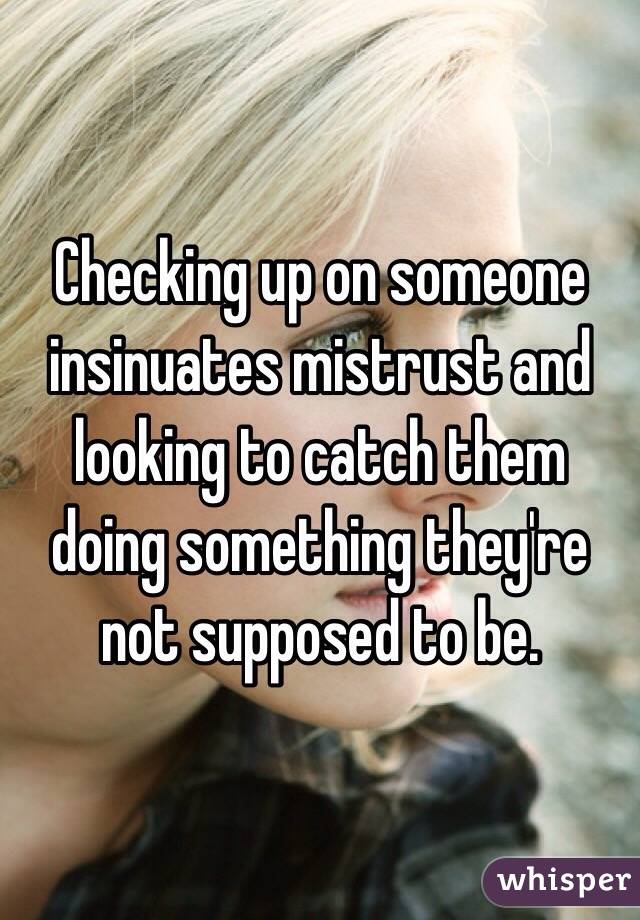Recently I read a blog about checking on someone. This
writer new best friend mentioned that is would be much easier if both people
lived in the same house, when checking up on the other. The writer
claimed that he had an ex-girlfriend who told him that he could not care as he
never checked up on her. The writer of this blog immediately thought, if
he did checked on her then he is did not trust her. That he never has to check on his partner as he trust them. I told him that maybe
he did not understand what she meant by checking up on meant in her eyes.
That all she wanted was him to care enough about her welfare. This
ex-girlfriend used to be this writer best friend. I made a comment on his
blog to this effect. He is very angry and does not care for my comment.
Don't get me wrong, this writer is a very good writer, just sometimes he
has a very closed mind to how others would interrupted certain subjects.
The English language can be funny in my
opinion. I decided to do some research on the subject.
One has the following:-
Checking on
Checking in
Checking out
I include a brief summary of what the
above means
"Checking up
on someone", usually indicates that you want to see if that person is
doing what he is supposed to be doing. e.g. I'm going to check up on my son and
see if he's finished his homework yet.
Checking in
This usually happens if one has been hurt in the past, and you check up on your partner because you don't want to be hurt in the same way again.
Checking up in more detail
The others, checking on, checking in are self explanatory, but checking on a partner can be very damaging to a relationship.
Trusting one another
In all relationships, not just romantic ones, trust is what makes them healthy and lasting. How easy we find it to trust others will depend very much on our past experiences. Some people approach new relationships completely trusting their partner until they are proved otherwise; others won’t trust anyone at all until that trust has been earned. Whatever your approach, how much you trust and how secure you are in yourself will have a huge impact on whether you will feel compelled to check up on your partner. Secure people, with lots of trust usually never feel the need to check up on their partners – it wouldn’t enter their head, maybe because they have never really had their trust broken.
If you have been hurt in the past you may justify checking up on your partner because you don’t want to be hurt in the same way again. The trouble is that by checking up on them you are actually breaking their trust and your actions could undermine the relationship – so by worrying that there is a problem you could end up creating one.
Building a case
Worrying that someone could be cheating on you, or that they don’t love you can prompt you to go looking for proof. The trouble is that you will probably find it; or rather you will find things that you interpret as proof. It is not a case of discounting your gut instinct. If you are normally a trusting person but you keep getting the feeling that something doesn’t add up you should take notice of that feeling. It is far better to confront someone directly than go behind their back. Tying to dig out information surreptitiously will mean that if you confront your partner with the evidence they can quite rightly accuse you of being dishonest too.
Modern technology
It is easier now than ever before to keep an eye on a partner’s activities through mobile phone messages and social media. Most of us keep up to date with each other in this way and there is no harm in it – we check each other’s face book statuses, read tweets and blogs and keep in touch via email and text message. Most people have nothing to hide and anything that is put on social networks is there because they are happy for everyone to see it. The line is crossed between honestly keeping in touch and dishonestly checking up when you start doing things that you know your partner wouldn’t be happy about, like logging onto their email or Facebook account without permission or checking their text messages when they are out of the room. If you feel uncomfortable about doing it, or suspect they would be angry if they found out, then you probably shouldn’t be doing it – you wouldn’t read someone’s diary so why would you read their private messages?
If you find yourself being drawn into this kind of behaviour with every relationship you embark on then it could be that you are suffering from low self-esteem. Until you tackle it your insecurity will stop any relationship from being able to flourish no matter how trustworthy the other person is.
Turn the tables

No comments:
Post a Comment